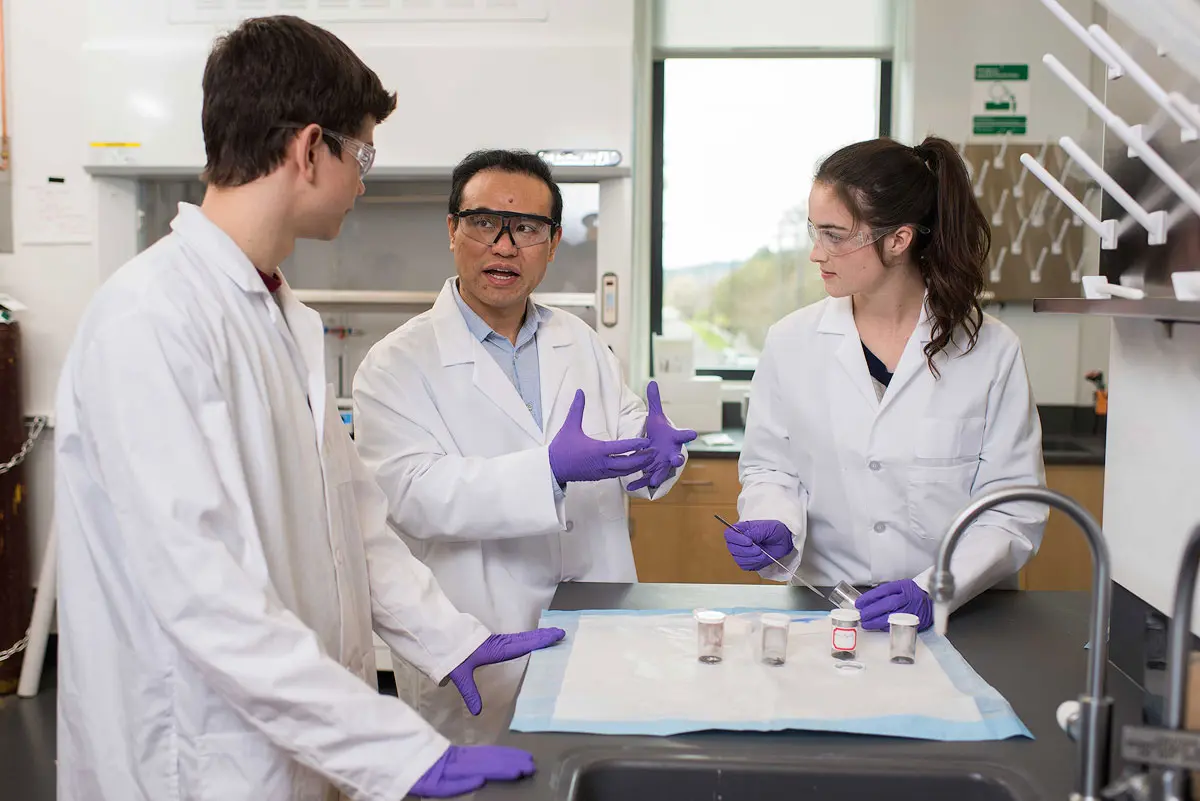What do Chemical Engineers do?
Chemical engineers turn raw materials into useful products — everything from clean energy and safe drinking water to advanced materials and life-saving medicines.
They solve problems related to energy production, environmental protection, health care, and more. Whether it’s developing bio-based plastics or optimizing water treatment processes, chemical engineers improve how we live.
What is chemical engineering?
Chemical engineering blends chemistry, physics, math, biology, and engineering principles into design processes that transform materials. Think large-scale manufacturing of everyday items like fuels, plastics, foods, and pharmaceuticals. Chemical engineers figure out how to take raw materials and transform them into useful products — safely, efficiently, and sustainably.

What jobs do chemical engineers do?
Chemical engineers are in high demand across many industries, including:
- Energy and fuels: Innovating cleaner, more efficient ways to power our world. Turning plastics into usable fuel excited Tatiana Ostrik, who has been a contributing researcher in Dr. Skip Rochfort's lab during her time as an undergraduate chemical engineering student.
- Pharmaceuticals and biotech: Develop new treatments, vaccines, and production processes. For example, Oregon State University chemical engineering graduate Brynn Olden is helping to develop a cancer treatment with the company Bristol Myers Squibb.
- Environmental engineering: Tackling pollution, waste management, and sustainability like undergraduate student Charles Harriman, who collaborated on a project to design a device capable of passively harvesting water in arid environments.
- Food and beverage: Ensuring safety, quality, and large-scale production. Megan Dodge is pursuing this with her doctoral degree at Oregon State, investigating the degradation of bioplastics into micro- and nanoplastics and their impact on the lifecycle and sustainability of consumer plastic products.
- Materials science: Creating new polymers, coatings, and composites like Oregon State chemical engineering undergraduate student Jose Naranjo Mendez, who explores the process of “upcycling plastics” using catalysts to convert polymers into monomers.
Many of our grads also go on to top-ranked grad schools or launch careers in research, consulting, and entrepreneurship.
What makes a good chemical engineer?
- A love for chemistry: This one might be a given, but good chemical engineers are good with chemistry. With chemical engineering, you can take your interest in chemistry to address real-world engineering challenges, such as finding more efficient ways to create food products, fuels, commodity chemicals and pharmaceuticals using catalysts.
- A problem-solving mindset: If you enjoy solving complex problems using math and science, chemical engineering might be for you. That’s what motivated Andrew Tran, an undergraduate chemical engineering student who wants to create a circular economy for plastics.
- A passion for impact: Chemical engineers work toward a better world, like creating more sustainable fuels, safer pharmaceuticals, or cleaner water. For example, Dr. Lucas Ellis believes that Earth’s plastic waste problem can be solved, and his lab aims to convert waste plastics into useful products.
- An interest in experimentation: Chemical engineers are at home in a lab, designing experiments, analyzing data, and improving processes.
- An eye for all scales: From molecules to manufacturing plants, chemical engineers think and work on all levels–the microscopic to the industrial!
When you choose where to study chemical engineering, you’re also choosing where you’re going to live for at least four years. Quality of life is an important factor to consider, and one that will have a significant impact on your academic success, so make sure when choosing a chemical engineering program you’re taking the right things into consideration.